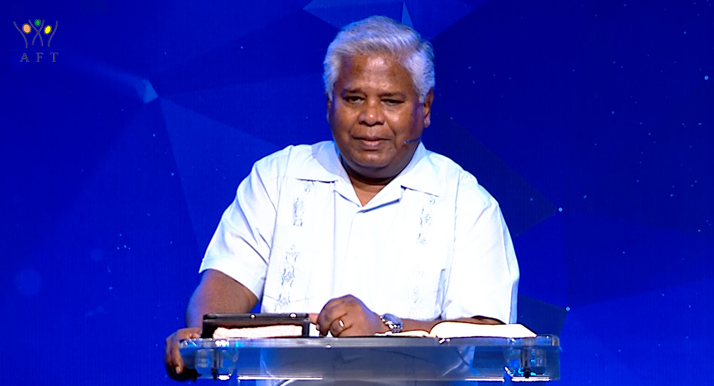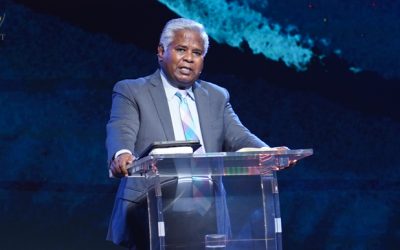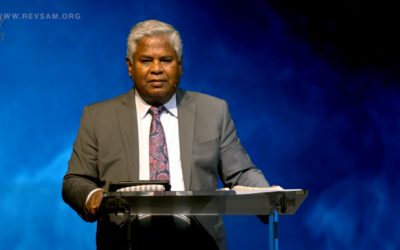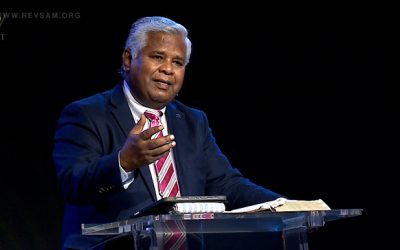
Abounding Grace (Vol. 47) – How Grace Changes Us? (Part-4)
Sunday English Service – 05 DEC 21
Transcript
Please turn to 1 Corinthians, chapter 13. 1 Corinthians, chapter 13. In the last three weeks, we talked about how grace changes us, right? How God’s grace changes us: “where sin abounded, grace does much more abound”. Whatever sin has ruined, grace of God makes it right and makes it even more beautiful. We’re talking about the work of God’s grace in our lives. So last three weeks, we’ve talked about how this process happens. We saw how we go from being a people who do the works of the flesh, with our sin nature, to people who have the fruit of the Spirit and live according to the Spirit. The works for the flesh are called “works” because they are your works done out of the sin nature. The fruit of the Spirit is what God does in us, produces in us as fruit by the Holy Spirit.
So, we saw that change comes when we crucify the works of the flesh and walk according to the Spirit and we talked about how we do it from Galatians, chapter 5, verse 16 to 25. Last three weeks, we looked into it, we saw that the flesh wars against the Spirit literally. It literally has a war against the Spirit. That is the fleshly instincts, the lusts of the flesh, rise up from within us, tries to forbid us from doing that which is spiritual. But the good news is, the Spirit also lusts against the flesh. That’s the way it’s put. The word “lust” is used both ways. The flesh lusts against the Spirit, that means fleshly desires are worked up, over desires are worked up and those desires keep us from being spiritual. But there are spiritual desires also, that are created in us by the Holy Spirit and they flood into us through the work of the Holy Spirit and therefore, in spite of our sin nature, wanting us to live, doing the works of the flesh, there is this overwhelming desire created by the Spirit of God in us, by the work of the Holy Spirit in us, that we overcome the lust of the flesh and live the spiritual life.
So, we talked about the process; I want to go through it a little bit more. We touched on 1 Corinthians 13 a little bit; I want to go into it a little deeper today. We’re talking about how grace changes us. Let me read you from 1 Corinthians 13, verse 1 to 8, the first part of the 8th verse. Though I speak with the tongues of men and of angels, but have not love, I have become sounding brass or a clanging cymbal. And though I have the gift of prophecy, and understand all mysteries and all knowledge, and though I have all faith, so that I could remove mountains, but have not love, I am nothing. And though I bestow all my goods to feed the poor, and though I give my body to be burned, but have not love, it profits me nothing.
Love suffers long and is kind; love does not envy; love does not parade itself, is not puffed up; does not behave rudely, does not seek its own, is not provoked, thinks no evil; does not rejoice in iniquity, but rejoices in the truth; bears all things, believes all things, hopes all things, endures all things. Love never fails.
Now, this is a very famous and very favourite passage for Christians everywhere. Whenever we hear it read, we’re kind of awestruck because of the description of love that is given to us here. But I think when the Corinthians first got it in the form of a letter from Paul and when they read it before the church, I think the reaction was a whole lot different from what the reaction is usually when it’s read now in the churches. I don’t think they appreciated it like we appreciate these days because they understood the context very well. They understood what he was trying to get at when he wrote to them like that. You need to understand Corinth and its people.
Corinth, of all the cities of the ancient world, of all the cities of the Greco-Roman world, was probably the most like any major city in the world today. Like Chennai, Bombay, Paris, New York, all these major cities, it had the characteristics of a major city. It was a place of commerce, that’s what cities are about, right? It was a small place, just a strip of land between two water bodies, connecting the two, so that things were unloaded here from the ships. Instead of going around, they unload here and they take the products over to the other side and ship them from there, wherever they want to go. They save a lot of time like that. So, it was a very busy, commercial place; a port where a lot of things were coming and going. And people that lived there, went there to be successful. They expected to make money, they expected to live a better life because they thought they will make more money. That is why they went there. They didn’t go there because it’s their granddaddy’s his native place or something like that. If they thought about that, they would live in their villages and wherever they were. Even today, we all move to a city because we want to get a better job, get into a better position, earn well, and so on. That was the same trend back at that time.
Now, it was a perfect place for commerce and the population there had every characteristic that usually characterizes the city population. The church also, the believers also, have the same characteristics of the population there. And as a result, that city attracted a lot of very talented people because it was a commercial centre that attracted a lot of very intelligent, brilliant, talented, able people. So, Corinth was made up of all these kinds of people that have come here, they’re enterprising, they want to be successful, they’re very focused in their professions, and they want to do well and that is why they’re there. And Paul is writing to them. In the first three verses, Paul is telling them what they are like, and what they already have. And he says, “Though I speak with the tongues of men and of angels, but have not love, I have become sounding brass or a clanging cymbal. And though I have the gift of prophecy, and understand all mysteries and all knowledge, and though I have all faith, so that I could remove mountains, but have not love, I am nothing. And though I bestow all my goods to feed the poor, and though I give my body to be burned, but have not love, it profits me nothing”, he says.
So, he’s describing the fact that they’re very gifted and brilliant people. They have various gifts: they have the gift of prophecy; they have the gift of communication. He mentions the gift that they have the faith that moves mountains, you know, that kind of a thing they have. And the faith that moves mountains, we’re familiar with it from Mark, chapter 11, where Jesus talks about it, right, where He said, “Whosoever shall say unto this mountain, Be thou removed, be thou cast into the sea; and shall not doubt in his heart but believes that whatever he says, will come to pass; he shall have whatever he says.” That’s what Jesus said. It’s a tremendous teaching on faith and Paul seems to know all of those things. He seems to have heard about this mountain-moving faith. A lot of people look at Mark 11 and the mountain-moving faith and they don’t even think that it’s talking about anything, about mountain-moving faith. They think Jesus was not talking about moving any mountains. He was only talking about that Mount upon which the temple stood, they say, and He wanted to curse that temple, because that has become a commercial place. It has been misused, corruption has set in, so He wanted to curse that place. So, instead of cursing the place, metaphorically He cursed the fig tree. He was not angry with the fig tree; He was angry with the temple because the temple story also comes with that chapter. So, they say that Jesus never taught mountain-moving faith.
But a lot of preachers teach faith from Mark 11, about mountain-moving faith. We believe that it’s talking about mountain-moving faith because I can show you the first 10 chapters of the Gospel of Mark, 10 narratives of faith are given to us, mountain-moving faith narratives are given to us, people who have mountain-like problems, coming by faith and getting healed or getting delivered and so on. 10 different narratives like that in 10 chapters then, chapter 11 is only the climactic story about Jesus cursing the fig tree and Peter sees the next day that the tree that Jesus cursed had withered away, has dried up from the root. And he points it out to Jesus and Jesus says, “Have faith in God”. It actually must be, “Have the faith of God”. Because if you say, “Have faith in God”, if that’s the meaning, then the next verse cannot say, “Whosoever shall say unto the mountain”; the next verse should say, “If you have a mountain-like problem, call me up. I’ll do something about it”. The next verse says, “Whosoever shall say unto the mountain”, that means, anybody can speak, not just to the tree but to the mountain and the mountain will be moved. So, the verse previously, the verse before that is speaking about having the faith of God. You and I can have the faith of God. The faith of God moves mountains, mountain-like problems can be moved, mountain-like problems can be overcome. That’s what He’s talking about and Paul seems to be very familiar with this.
So, Paul is talking about all of these things. These people are tremendously gifted; they are brilliant people. And some of the people today, when people write commentaries on this, some of them don’t believe in miracles, mountain-moving faith, and all of that. So, they say it’s a leadership gift. They say mountain-moving faith is a leadership gift. What is a leader? A leader is someone who can overcome any kind of difficulty or problem and make a success of whatever he’s doing, the business or organization or whatever. He can turn it around. There are people that are in that kind of business, they know how to do it, they have confidence, and they have the ability to do it. They will turn everything around; that which fails, they can take and turn it around. So, they say mountain-moving faith is referring only to that kind of leadership quality, that’s in a person. A person has mountain-moving faith; he can turn failures into success.
Well, I believe that literally, mountain-moving faith can be experienced literally, just like the first 10 chapters of Mark. People experience, we can experience it. For example, a paralytic man was brought, he could not get in where Jesus was. They take him over to the roof and they drop him in through the roof. And Jesus sees their faith. The man who was bed-ridden also has faith because when Jesus said, “Take up your be and walk”, he was ready to walk. He was not saying, “Look, I came here because I couldn’t walk. What are you telling me to walk? How can I walk?” No, he was ready to receive his healing. He had faith. He had a mountain-like problem and here he’s experiencing mountain-moving faith. And this kind of story, 10 different stories are there the first 10 chapters and the 11th chapter comes up with the mountain-moving faith story.
So, I believe it’s talking about that kind of mountain-moving faith, but the modern commentators who don’t believe in miracles say, it’s a leadership gift. I am for that also. I like that leadership gift. I like the quality in a person which can turn around anything, any failure into a success. People who can move mountains by faith. It requires faith to run anything, to run a company, to run an enterprise and to make a success of it. And I can see how that can be considered as mountain-moving faith. So, Paul is telling them that these people are brilliant, they’re good and they have so many gifts, they have so many abilities and so on. But he’s pointing out to them that though they have all these abilities, all this brilliance about them, they’re very gifted, they don’t have what he’s talking about in verse 4 to 7. That is the love. The love that suffers long, love that’s kind, love that does not envy, love that does not parade itself, love that’s not puffed up. This love that is given here, in 4 to 7, that is not there. He’s pointing it to them. The reason why the Corinthians were like that was this. They had a reason why they were like that – they’re city people. The cities have a quality about them. It’s more about their profession and performance in their professions, even today.
Those who moved into the cities know very well that people in the city don’t care about your personal life and what you are as a person, your heart, what kind of a heart you have, whether you’re a good person or not, that doesn’t matter. As long as you can perform, as long as you can excel in what you’re doing, as long as you can sell your product, whatever you’re selling, and you can meet the target and you can make the success out of your business and bring profits to your company. They’re fine. They’re very professionally oriented, the city people are, professionals. And their policies, don’t talk about my personal life, I have a few issues personally, but look at my job. I’m good at my job. I’m very successful at my job. I can do my job. Don’t talk about my personal life. Don’t talk about what kind of heart I have. What kind of a person I am. That doesn’t matter, as long as I perform. That’s the city mentality. I believe the Corinthians had that kind of mentality, that performance mentality. They didn’t think the heart was important, but Paul says, “Look, you’ve got a typical city mentality. You think performance is more important than what kind of a heart you have. What kind of a person you are? But in the Christian faith, what matters is what kind of a heart you have, what kind of a person you are”. Because just like Jesus said, “A good person out of the treasure of his good heart brings forth good things”. Jesus is talking about how good things come about in a person’s life. How does a person produce good things out of this life? Out of a Christian’s life, good things comes not because he’s got a competitive spirit and he can kick others around and he can push and shove and he can use all kinds of tricks and make his way to the top. That’s not how he makes it. A Christian succeeds because his success comes from a good heart, a true heart, a heart that is filled with love, a heart that is filled with all the things that we read about here about love. So, Paul is saying, “Look, you have all the brilliance, you have all the stuff, but your heart has something lacking. Your heart is no good, your heart is rotten, your heart is not in the condition that it should be. And in Christian faith, the heart is the most important thing”.
Now, look at the way he talks about it. He talks about it as if he’s talking about himself because he knows that it’s a sensitive subject. You cannot write to people and tell them, “Hey, your performance is good, but your heart stinks”, you know. If you say something like that they will be upset. So, he says, “Though I speak with the tongues of men and of angels, but have not love, I have become sounding brass or a clanging cymbal. And though I have the gift of prophecy, and understand all mysteries and all knowledge, and though I have all faith, so that I could remove mountains, but have not love, I am nothing.” So, he’s talking about the whole thing as if he’s doing it, that it’s happening to him because it’s a very sensitive subject. What he is doing here is, he wants them to know that they are good, gifted, brilliant and so on. But what he’s talking about in verse 4 to 7, about love, that is what is lacking. So, he wants to talk to them about inner heart change. How can they be changed in the heart? How can they be transformed? How can they become a new kind of people? How can they become a true Christian person, motivated in their heart by love and functioned by love and produce good works by love and all of that? These people are producing a lot of good works but it’s not out of love. He wants to point out that they need to have the right motivation. That’s why he’s writing that.
Now, the way he puts it is this: first, he talks about two things that heart-change is not. He talks about heart-change. First, he wants to tell them what heart-change is not. He tells tow things about what heart-change is not. And then, he talks about what heart-change is. When a heart changes, he definitely says, this is what a heart-change is. First two things he says, let me show you what a heart-change is not. Do not confuse in your mind, something else with the change of heart. The first thing is, he says, “Don’t confuse the inner heart-change with being gifted, talented, being brilliant”. That’s where he talks about gift of prophecy, fathoming all mysteries and knowledge and having faith that moves mountains and so on. These people are gifted but don’t confuse that with heart-change. Don’t look at a brilliant, very able, very capable person who can do tremendous things with his mind, with his brilliance and with his talents and conclude that he’s got a good heart. That’s what is coming to. He says, “A person may perform good in other things but may not have a good heart. It’s possible for a person to perform well but not have a good heart”.
I’ve told you about Jonathan Edwards; you heard me talk about Jonathan Edwards, the great American preacher and philosopher, back in the old times, 200 years or more ago. He preached a sermon on this and he said about this, he talked about this text and he said some very astounding things about this. He says, he quotes Matthew’s Gospel, chapter 7, verse 22. That’s the verse where it says, Many will say to me in that day, ‘Lord, Lord, have we not prophesied in thy name? and in thy name have cast out devils? and in thy name done many wonderful works?’ Do you remember that? And the Lord is going to look at them and say, “I never knew you; get away from me, you wicked people”. I never knew you. He quotes that and he says that it is possible to have gifts and abilities and talents, but at the same time, have no special work of the Spirit in the heart happening. No change of heart, but outwardly brilliant, outwardly good performance. He says it is possible that a person can be very intelligent, very gifted, can do great and mighty things, but have not experienced the grace of God that changes them on the inside.
So, he says, the gift of the Spirit — that is the giftedness that comes from the Holy Spirit giving some gifts to a person — are excellent things, but it should not be confused with the work of the Holy Spirit in a person’s heart, changing him into a wonderful person. That’s a whole different story. “The gift of the Spirit is different from a change of heart”, he says. A very interesting way he compares it. He says that the gift of the Spirit is like precious jewels, like a jewel a woman wears, like a makeup or something like that, that a woman wears. She’s all made up well outside, she’s got all these beautiful jewels, all decked up, and she looks good and glittering. But it’s all outwardly done, you know? You remember in 1 Peter, chapter 3, Peter talks about what makes a successful marriage. He’s talking about women and I think he has in mind how women sometimes think that outward beaty can bring success in marriage. So, they pay more attention to the outward beauty. That is why cosmetic stuff sells for billions of dollars because they believe the outward beauty can bring success.
So, he says, “Do not let your adornment be merely outward—arranging the hair, wearing gold, or putting on fine apparel—” Have you read that in 1 Peter, chapter 3? Do not let your adornment be merely outward—arranging the hair, wearing gold, or putting on fine apparel—rather let it be the hidden person of the heart, with the incorruptible beauty of a gentle and quiet spirit, which is very precious in the sight of God. Here he’s talking about a heart change. Christianity is about heart change; it’s not about just outside. It is sad that we have gone in the wrong direction for many years, in the Christian church and paid so much attention to the outside, talked about what to wear, what not to wear and this and that and so on. But Christianity is not about that. Christianity is about the hidden person of the heart, the incorruptible beauty. What is incorruptible beauty? The outward beauty is correctable. If wind blows a little strong, all thing is gone, you know, everything flies. And a few drops of water can just ruin your face. You wish you’d never put that stuff on because it can really do a bad job on you. It can change in just a moment’s time. Outward beauty is so fleeting, it is so momentary. It lasts for very little time, even without the wind and the rain coming, even otherwise, it’s just for a few years.
One fellow wanted to go and he was invited to come and see. They were looking for a bride for him and they’d arranged to meet the girl’s family, I guess. So, he came to me and he always insisted that the girl must be very beautiful. That’s all he wanted. Just a beautiful girl. So, I didn’t know how to tell him the bad news. So, he came to me and said, “I want your prayer. I want to go and see this girl with my parents. We’re going to their house and I want you to pray. All I want is, I want a beautiful girl. That’s all. I want her to be this way” and he described everything. So, I was waiting for a chance to get to him. So finally, before we prayed, I said, “Look, when you go there, please remember to see whether she’s got a grandmother there. And if she’s got a grandmother there, make sure you take a good look at her”. He said, “Why should I look at the grandmother?” I said, “Because in the end, that’s what you’re going to get. After a few years, she’s going to look like that. You better decide now whether you want that in the end or not. Don’t just see the beginning. In the end, she’s going to look exactly like the grandmother. So, take a good look at her.” And I think that cleared him up a little bit, that beauty is not everything. We put so much trust in beauty but the Bible teaches it’s not just the outward beauty. The Bible is not against outward beauty. The Bible is not against your makeup or your jewellery or whatever. I’m not a person who preaches like that. The Bible is against believing that it’s the outward beauty that brings success. The success in marriage is brought about by the incorruptible beauty. What kind of a beauty is that? It’s a gentle and quiet spirit. That is the thing that we have in the description about the love, that we read about in 1 Corinthians 13.
So, Jonathan Edwards says that the gifts of the Spirit are like this woman that’s decked up with all the jewellery and the makeup on the outside. It’s like outward beauty. That’s good and you can have it, but the heart change that is brought about by the Holy Spirit, the changed heart, where you become a different kind of person, not just the gift that you receive from God, but you become a different kind of person, that is long-lasting, he says. Even in 1 Corinthians 13, after talking about these things in the first eight verses, then it goes on into how all prophecy and all of these things are going to cease, you know. Some people say that it has ceased now; I don’t believe so. Miracles, prophecies, and all, have not ceased. We still need them because we live in an imperfect world. Many times, we need miracles, but we’re going to go into a time when Jesus comes, when the world will become a perfect world. The devil will not be the god of this world. The devil will be put away, sin will be put away and there’ll be perfection like you’ve never known. After Jesus comes, this is going to happen, the redemption of everything is going to be fulfilled. And at that time, you won’t need miracles, you won’t need prophecy.
See, Genesis, chapter 1 doesn’t begin by saying, “In the beginning, was miracles”, you know. In the beginning, the first chapter says, everything was good, that’s why you didn’t need a miracle. Only after sickness came, all the curses came, and all the bad things came, then you needed a miracle to deliver a person from that situation. In the beginning, there was no need for miracles because the world was such a world where everything was good, everything that God created was good. There’s no need for miracles! There was blessing. When you have blessing, oftentimes, you don’t need miracles. In the beginning, there was blessing, no need for miracles. In the end, there will be blessing, there won’t be need for miracles. So, then in chapter 13, in 1 Corinthians, it talks about how those things will cease, these prophecies and all these things will cease. But one thing is going to go on till the end, it says in verse 13: Now abide faith, hope, love, these three; but the greatest of these is love. Notice those words: ‘Now abide faith, hope, and love’. That word “abide” is very important. It’s saying, “Now these three things are going to stay forever, eternally; they’re not going to cease”. Miracles may cease, prophecies may cease, all these mighty works may cease because there’s no need for that in a perfect world. But one thing will not cease is what has happened in your heart, the love, the faith, the hope, all of those things, the things that belong to the heart are going to continue with you for all eternity. That’s the way the Bible presents it.
So, Paul is saying to the Corinthians, “Hey, you are very brilliant, you’re gifted, you’ve got the gift of prophecy, you have all kinds of knowledge, you can teach others and you have revelation. You can tell what’s going to happen tomorrow. All of those wonderful gifts and stuff you have. But the problem is, you don’t have what I described in verse 4 to 7”. And he’s telling people, “Don’t think just because you’re gifted, that’s what Christianity is all about, or just because you’re gifted, that you’ve changed, you have gone through a change in your heart. The Holy Spirit has brought about a change in your heart. Change in your heart brought about by the Holy Spirit is totally different from the gift of the Spirit that you receive that makes you so gifted or such a gifted person. So, don’t confuse the two”, he says.
Secondly, don’t confuse good works, doing good and being good with a changed heart. Just because a person does good and just because a person looks like he is a good person because of the works that he does, do not think that something has happened in his heart, some real heart change has happened. Don’t confuse heart change with other things, in other words. Don’t confuse it with gifts, with other brilliant abilities that he has, because a person can have brilliant abilities and not have any change in the heart brought about by the Holy Spirit at all. He says, “That’s why those fellows get cast out devils and do miracles and all that and say to Jesus, in the end, we cast out devils in your name, we heal the sick and so. And He says, “I never knew you; you’re wicked”. Because the work of God’s grace has never happened in the heart. It’s possible for people to be gifted by God and not be changed in the heart. That’s what he’s saying. And now, he’s saying, in the next step, he’s saying, The inner heart change should not be confused with being good or being good.
Look at verse 3, there is another list. Verse 2 gives one list, that is gift a prophecy, understanding all mysteries, all knowledge and mountain-moving faith and all; that’s a different list. Verse 3 totally gives another kind of list. It says, “And though I bestow all my goods to feed the poor, and though I give my body to be burned”. See, this is a different category. This guy is a guy who hears about verse 2, the prophecy, knowledge, and mountain-moving faith and all that. He says, “Well, that’s not very important.” We’ve heard people say that. Oh, prophecy, that’s not very very important. Oh, mountain-moving faith, that’s not very important. Oh, revelation of what’s going to happen tomorrow and all that prophetic stuff, all that is not important. What is very important is that you should be ready to sell everything that you have and give to the poor. Now, that sounds very nice. He’s a guy that says this is what a true Christian is. He sells everything and gives everything to the poor and you must be ready to even die for a good cause, for the truth that you believe in. It’s a totally different kind of list. This guy looks like he’s really good. But the thing that people have about this verse is, Paul is saying, “Though I bestow all my goods to feed the poor, and though I give my body to be burned, but have not love, it profits me nothing.” Some translations say, “I gain nothing”. In other words, he’s literally wanting to say, you gain nothing but he doesn’t want to put it like that. He doesn’t want them to be upset. He says, “I gain nothing”. He puts it all on himself. He acts like he’s talking about himself. He says, “If I don’t have love and I have all these things, if I can give everything that I have to the poor and even give my body to be burned and have not love, I gain nothing by it”, he says.
So, what he’s saying is, here is a guy who’s ready to sell everything that he’s got and give it to the poor. Paul says, “You gain nothing by it; it’s worthless”, in other words, he’s saying. This guy is ready to even die for a good cause and Paul says, “It’s worthless”. Why? Because you could be doing those good works for two completely different reasons. That’s the thing. One reason is good, the other reason is bad. Let’s look at the bad reason. Why would anybody do some good works? Why would anybody be very charitable, very generous and make it known? Some of these people that are doing it for a bad reason, with a bad motive, want it to be known that they are doing it, that they are being charitable. They gather a crowd, they bring the photographers, they tell the media, they invite everybody and Jesus said, remember in the Sermon on the Mount, He said, “When you give arms, when you give charity, don’t let your left hand know what your right gave”. Now, people take that and apply it to giving offerings. They give it like this, you know. Don’t want to left hand to know what the right hand gave because they think the Bible says that. The Bible is not talking about that. It’s not about giving offerings; it’s about giving charity, arms, helping the poor. Why it’s telling them to do it like that? For many reasons. One reason is, a guy who has nothing already feels ashamed that he’s in that condition, that he’s poor, that he’s got to seek the help of someone. And now, you’re putting in the limelight and you’re calling the media and they’re all focusing on him, shedding the light him, saying “This guy; he’s the guy”, you know. He doesn’t even have food, he doesn’t have clothes, he doesn’t have nothing. And here we are going to give him five saris and two dhotis and we’re going to give him this and we’ll focus all attention on him. That’s very insulting to the guy. The guy is already ashamed; he feels very small; he feels very insulted by the fact that he’s suffering like this and he’s got to stretch his hand out to somebody. The best way to give it to him is like Jesus says, “Don’t let your left hand know what your right hand gives”. Call him to the side and say, “Hey, I know what you’re going through. Here, this is what I can do for you. Here is a little help. Take it and use it”.
But Christians have completely misunderstood the context and they’ve turned it into something else. Why would a person be very charitable, especially these kinds that are very open and they’re very interested in publicizing this charity? Why they do like that? They don’t like that because the motive is not love. The motive is not out of the pure heart of a heart of love. The motive is something different, that is why they do it like that. Oftentimes, the motive they say is they feel so insufficient themselves; they feel so small, they feel that they are not counted as anything, that they are not considered as anything big. They want to project themselves as somebody. So, they say, “I’ll give this much; you put my name over there. I’ll give this much but I will come and do this”, and so on. That kind of condition they lay and they’re interested not in the person who needs their help; they’re interested in themselves. That’s the thing. That is the wrong motive. It is about that kind of a person this verse is talking about because a lot of Christian people I know, are confused when they read this verse. How can Paul say something like this? Some people are already upset with Paul about so many things. And when they read something like this, they’re really upset. How can he say, “Even though I bestow all my goods to the poor, and I give my body to be burned, if I don’t have love, I gain nothing”? How can you say that you gain nothing? The whole point is that it is not done in the motivation of love. Love was not the motivating force. It is done with selfishness. It is done for selfish gains, he says. That is why he says that that kind of activity is not going to bring any profit to you. It’s not going to make you any better. It’s not going to get you any favours with God. It’s not going to get you any blessings from God. It’s nothing. It’s not going to work out to anything, he says.
Now, it’s amazing how he deals with it and he deals with it boldly. He points it out to them very clearly. So, how do you know whether what you’re doing is either for the right motive or wrong motive? Out of love, or out of some other motive? I think there are two ways to know it. One is the list in verse 4 to 7. That list is very important. Verse 4 to 7: Love suffers long and is kind; love does not envy; love does not parade itself, is not puffed up; does not behave rudely, does not seek its own, is not provoked… Now, this list is different from the 10 Commandments. The 10 Commandment are more blunt. Says, Thou shalt not commit murder; thou shalt not commit adultery, thou shalt not steal, that kind of stuff. It’s more blunt. But when Jesus interprets it in the Sermon on the Mount, have you noticed, He’s not putting it that way. He’s putting it the way 1 Corinthians 13 puts it. 1 Corinthians 13 is not blunt. It is dealing not with the action itself. It is dealing with what goes behind the action, what undergirds the action, what is the reason for the action? It’s talking about that, so it’s more subtle. And when Jesus interprets the 10 Commandments in the Sermon on the Mount, He’s dealing with it like that. For example, you know, the murder. He says, “You’ve heard it said, Thou shalt not murder”. So, if He asked today, how many of you have murdered anybody? I’m sure there’s nobody here that’s murdered anybody. Everybody will be clear of that charge. I don’t think anybody’s here who’s a murderer. Jesus doesn’t deal with it like that. If you deal with it like that, then most people will think, “Well, I’m perfect; I’m a righteous person”. What He says is, “You’ve heard it said, ‘Thou shalt not murder’, but I say to you, if you’re angry with your brother, if you call hm a fool, that’s like murder, that’s worthy of hellfire. You’re worthy of punishment of hellfire”. Why? Because there’s anger, there’s animosity, there’s hatred that you have inside, that shows up in those words, “fool”, is the thing that could produce a murder later on. You literally have murder in your heart. Before you commit the murder, you’ve got to have murder in your heart, you’ve got to have it to your heart.
So, the Bible is like that. The Bible is not dealing with just the outward actions, even though the 10 Commandments puts it in terms of outward actions. When it is properly taught, like Jesus teaches it, it’s going behind what is there behind the actions. It is dealing with what is there that is undergirding that deed. And so, 1 Corinthians 13 is like that. 1 Corinthians 13: 4 to 7 talks about the love that undergirds the good actions, the motivation of love and what it contains and so on. So, one way you can find out is when a person that does a good deed and is projecting himself as the worker of good deed. When he says, “I bestow all my goods to feed the poor” and wants to show himself like that, you take verse 4 to 7 and see if this is there in him. If he’s a selfish person, if he’s a person who parades himself, if he’s a person that’s puffed up, if he’s a person that’s seeking his own welfare, if he’s a person that’s provoked very easily, very touchy, that he cannot even stand a little bit of irritation by anybody. If that person is rejoicing in the evil that’s done to those who he doesn’t like, if he’s a personal who cannot bear anything, he cannot even bear the slightest discomfort. He cannot believe anything; he’s a doubter, great suspicious mind he has. He doesn’t believe anything, doesn’t want to endure anything, doesn’t have that those qualities. That person if he says that I do this, and I do that and I give all my wealth to the poor. The Bible says that person is doing it out of a wrong motive.
The second way you can find out is in verse 8 here, in 1 Corinthians 13, the first line: Love never fails. Now, love failure is a very popular thing in our country, right? I remember when I was young, my dad used to buy the English paper and Tamil paper. I read both of them very avidly. And one of the characteristics of the Tamil paper is every day, they’ll have a love failure story. As a young boy, it was very interesting to me. Boy falls in love with some girl and the girl ditches him or the boy ditches her and so, they go and fall in some well or somewhere in the ocean and kill themselves. And they will write in a very moving way in the Tamil newspaper, as if they were there, going through the whole thing. Those guys were very good at it. But the thing is, if it fails, it’s not love because the Bible says, “Love never fails”. Now, if it fails, you ought to be glad that it failed because you should be glad that you didn’t get married and then fail, you know. You should thank the guy a thousand times and say, “Bye, bye” and keep going because if it’s love, it never fails. So, if a person is doing the good deeds has a love that fails. If he has a love that fails, that’s not love at all. The good deeds, whatever he’s doing, or she is doing, is done not with the right motive. Not with the right motive at all.
I read some statistics, very interesting. In our country, I don’t know if they do studies like this but in Western countries, they do all kinds of studies in these things. They say that research shows shockingly high percentage of times when addicts, like alcohol addicts, drug addicts, you know, when they get over their addiction, see when they’re in their addiction, their wife or somebody, spouse supports them. With them, they work, they go to work, they work very hard and they feed the family and they take care of this guy and do everything for them and so on. But all of a sudden, something happens and this guy is changed. This guy quits and he cleans up and he goes to work and he starts doing everything right. Research shows, very interesting. Research shows that oftentimes their marriages break up as a result. Why? They say because the person who’s helping the other person, all this time, had something to value themselves by, that they are doing everything, that they are sacrificing everything, they’re working so hard, they’re doing this and they’re doing that, and so on. They felt very important and significant but now, the guy cleaned up and he got well. Now, she or he is not needed that much to take care of him or her and so they feel unwanted and it causes a friction in the relationship and it breaks up, it seems. This is real statistics. I just can’t believe it but they say it happens. That kind of a thing, but if that fails like that, then, with what motivation was she or he doing, all that they were doing, all this time, when the guy was having the difficulty? Why? With what motive? See, it was the wrong motive; it is not out of a pure heart, it’s not out of love and that is the kind of thing that Paul points out here. You can do good; you can be very sacrificial and so on but still, if it’s not done in love, he says, “You gain nothing by it; it’s worthless”. It’s worthless.
So, inner heart change must not be confused with these things. It cannot be confused with giftedness because a person can be terribly gifted, but still not have a real heart change happening, still not have the work of the Holy Spirit in his heart, changing him and transforming him. That has never happened. It’s possible; Jesus Himself says that. Similarly, not only giftedness, but goodness. When people exhibit certain goodness by doing good things, we should not confuse it for the grace of God that’s done something in the heart of a person to change that person. That’s exactly what Paul is pointing out. So, if these two things are not real hearts change, we should not confuse these two things with heart change. Then, what is change of heart? That’s the thing that we ought to know. What is change of heart? Change of heart is not just being gifted, it’s not being good. Change of heart is being touched and transformed by the grace of God. The grace of God comes into a person’s life and touches that person and transforms that person in a remarkable way. A real work of the Holy Spirit what happens in that person. How does that happen? What happens? What does he mean? The implication is this, that when a real change of heart happens in a person’s life, he begins to do things not out of a need that he has, not because he feels hopeless, he feels insignificant and nobody thinks of him as anything important and therefore, he’s trying to do something to prove himself and show himself as good. He’s got a purer motive; he’s got a clearer motive. He does things not because of an emptiness that he has and a frustration that he has. His good works are not the result of that. He is doing it in response to a fullness that the Holy Spirit is brought into him. He’s doing it in response to something that has happened, something marvellous, and something positive that has happened in his heart.
How do you do that? How do you do good works as a result of being full inside. Look at verse 4 to 7 and here, is something wonderful. In 4 to 7, in just about every translation in the English language, it is said in such a way that it gives you adjectives. And you know what adjectives are. It describes the noun, right? An adjective describes a noun, like it happens here. In my translation, the New King James Version, it says, “Love suffers long and is kind; love does not envy; love does not parade itself, is not puffed up”. So, it talks about love and then it describes love further; that’s what adjectives are. It’s describing the noun further. That’s the way it is presented to us. But they say, in the original Greek, it comes in a slightly different way, a whole different way, that is, it is a noun followed by a verb. It is an action word. A verb is an action word. It’s followed by a verb. So, one man translated like this. He says, “Love suffers a long time with patience”. Now, this is different from saying, “Love suffers long”. Love suffers long is a description of what love is. But when it says, “Love suffers a long time with patience”, it’s really telling us what love does. Now, he says, “Love suffers a long time with patience; love shows kindness”. It’s all actions, you see. He translates it in terms of verbs. “Love does not burn with envy; love does not get inflated with its own importance; it’s never rude and ill-mannered, rather love joyfully celebrates truth; gives all kinds of support, never loses faith, never exhausts hope, never gives up”. Wonderful translation. He puts it the way Paul is conveying it.
Now, why is the difference important? Why adjective versus verb is important. Why adjective leads us or misleads us. It misleads us because if it’s adjective, if it’s simply describing what love is, then it would mean that it’s giving us a set of guidelines as to what love is. It’s simply informing us what love is. What is love? “Love is kind”; it’s a description of love. When you say, “Love shows kindness”, that’s in the verb form. That’s a totally different thing. So, if you use adjectives, they say, you’re simply describing what love is. You’re telling people, “Let me tell you what love is. You’ll learn what love is, then you’ll practice that love”. Let me tell you what love is like: Love suffers long, love is kind, love does not envy, and so on. And you learn what love is by these descriptions given in the adjectives and then, you follow those descriptions and practice those things. That’s what it’ll mean. But when it is looked at as s verb, which is the way Paul puts it here, it is talking about what love does, what loved does, and more importantly, now listen to this. More importantly, it’s not only what love does. When Paul is talking about love each time, he mentions love each time, and when he talks about love, he is thinking of a person. He’s personifying love, they say. Love is not a thing; it’s not a concept to Paul. It’s a person, personifying love. And there are two reasons why he does that, they say. It means personifying love means putting it in terms of a person. And that means two things. One, it means something general and this is this. Paul is saying that you will never be a loving person, if you think that love is a set of guidelines that you somehow have to pick up and breathe life into it. You’ll never be a loving person if you think love is a set of guidelines. A lot of times, we’ve made the mistake of looking at this passage as a guideline for what love is. We try to follow the guideline but Paul is really saying, you’ll never be a loving person if you think love is a set of guidelines that you have to somehow pick up and breathe life into it. You have to learn from this, what love is, and just follow it. Only when you look at love as a person, think about love as somebody, only then, will you be able to really live in love, he says.
Now, you will understand that if you look at it in the whole context of the 1 Corinthians, 1 Corinthians begins with all the problems that the Corinthian people have. The Corinthian people are fighting amongst themselves; there are divisions; they’re divided as a church. Some say that they are of Paul, therefore Paul’s followers. Others say, they are Apollos’s followers. That’s another famous preacher of those days. They say, “Well, Paul is a better preacher; we follow him”. And then, there are others who say, “We follow Peter because he is the original Apostle that was with Jesus. Paul and Apollos came later; they didn’t even meet Jesus or were not even one of the Disciples. So, we follow the original Apostle, Peter”. Like this, they go on, dividing themselves, fighting amongst themselves, and so on. And Paul comes in there, if you read the first three chapters, it’s very interesting. He says, “You have divisions; you’re fighting; you’re envying; you’re jealous about one another; you’re complaining about one another. You have so many misgivings. This is not a church; this is just a fighting place”. And why are you fighting? Why are you dividing into so many groups? Why are you behaving like this? The reason you’re doing this is because you’ve failed to look at the Cross; you’ve forgotten the Cross of Jesus Christ! How do I know he says that? He says there, something like this. He says, “You’re talking, saying I’m of Apollos, I’m of Paul, I’m of Peter. Did Paul die for you? Did Peter die for you? Did Apollos die for you?” This is exactly what he says. He is talking about Who died for you! Did any of these three people get crucified for you, for you sake? Did they give their life on the Cross for you? That’s exactly how he puts it. So, he brings up the Cross there. Who died for you? Who was crucified for you? You forgot the Cross; you kept that out of the picture. Therefore, you’re fighting. Wherever you see fighting, this is what has gone wrong. They have forgotten Jesus. They have forgotten the Cross. All these other issues are clouding them, that’s why they’re fighting in a fighting mode.
In 1 Corinthians 13, when it comes to 1 Corinthians 13, that’s the context. In 1 Corinthians 13, people say, “Well, he never mentions the Cross here”. No, he doesn’t mention the word, “Cross” here at all, but the Cross is there. Where is the Cross? Love is the Person; love is Jesus. That’s how Paul is thinking of it and that’s how he is talking about it. Love is a Person. He’s not mentioning the Cross here but he’s dealing with their problems in light of the Cross and Jesus. Why does it say, “Love suffers patiently”? I read the translation; the translation says, “Love suffers long; love suffers patiently”, right? Where do you see love suffering patiently? If you see love as a Person, Jesus, then you look at the Cross, there, He hung there, He cried, “My God, My God, why hast Thou forsaken Me?” And Charles Spurgeon says, when he preaches on that, he says, “He looks down as He hangs there, He sees that God has forsaken Him to die there. He has been in fellowship with God from the beginning. He has never done a word or a deed without His knowledge. He only did what God wanted Him to do. He only spoke words that God wanted Him to speak. He was in close fellowship and communion with God. He spent so much time with God. Throughout all eternity, He was in close fellowship with God, even when He came as a Man into the world. He never lost touch with God. He was One with the Father, completely doing the Will of the Father. What do you think would have happened to Him when He hung on the Cross and He’s hanging there? The Father has left Him to die and He’s crying there, “My God, My God, why hast Thou forsaken Me?”
Now, I’ve seen cases where husband and wife have lived together for 50 years, 60 years and when one dies, the other feels completely lost because 50, 60 years they’ve lived together. So, when one is gone, the other person doesn’t know what to do. They’re completely lost, you know. They just don’t know how to go about it. I’ve seen cases like that, really. And they’re ready to go. It’s difficult because 60 years, we’ve lived together, now, how do you expect me to live alone? Just imagine Jesus, from eternity past, for eons and eons and ages and ages, He’s been with the Father, from the beginning, from before the beginning, He was there with the Father. He’s the eternal Son of God, never separated from the Father God. Now, when Jesus hangs on the Cross, He’s separated from God. God turns His face away because He has become the sin. He has become sin for us; He has taken on our punishment. He is cursed with our curse. He’s taking it all on Himself. Therefore, God turns His face away, because He’s a God Who’s so pure that He cannot look upon sin. He turns His face away, the Bible says. And He cries, saying, “My God, My God, why hast Thou forsaken Me?” And while He’s hanging there, crying, He looks down. There are these guys that are making fun of Him, saying, “You cannot save Yourself, how are you going to save others? Come down. Let’s see you come down”. And the thing is, He had the power to come down. He could have come down with one finger moving from Him. If He wanted to do that, these guys would have all become ashes, right there. None of them would have survived. He could do it. He could completely destroy them. He could simply step down from the Cross and would have gone home without a wound in His body. He could do that. But He saw these guys, He saw those that hated Him, betrayed Him, and hung Him there and nailed the nails on Him. He saw the people that cried, “Crucify Him!” He saw them standing there and He suffers long. That’s long suffering; He’s ready to wait. He’s got to wait three days. He’s got to go through the suffering, shed every drop of His blood and give His life and wait for three days and believe what God has said He will do. God said He will raise Him up on the third day. He had no doubt that God will raise Him up on the third day. He believed; He suffered long. So, when it says, “Love suffers long”, it’s about Jesus, that Paul is referring. And then, all the fellows there in Corinth, they’re all keeping records of wrongs done towards each other. They’re keeping scores. But Paul says, “Well, you’re fighting like that. You’re talking about who did what and all that and you’re having a big fight over this, your differences, and your divisions because you’ve forgotten the Cross. Look at the Cross”, he says because there, love which is kind, love that does not envy, love that is able to suffer long, that love says, “Father forgive them for they know not what they do.” He’s not keeping scores. He is not remembering everything that they did. He forgave them and He prayed for their forgiveness.
Finally, and you can go on with every single item there. Everything is a description of Jesus, of what He is. It’s the description of Jesus; it’s the description of a Person. And ultimately, he says, “Love never fails” in the last line. Here is the love that never gives up. In the Garden of Gethsemane, He almost wanted to give up because He thought about the suffering and the pain, the agony that He was to undergo as a Man who carries the sin of the whole world. And He looked at the Father and said, “Father, if it be possible, removed this cup from Me”. But then, He came back to focus on God’s will and He said, “Nevertheless, not My Will but Your Will be done” and gave Himself and never gave up. Love never fails. Love never fails.
So, here’s the key. So, if you see verses 4 to 7 as a guide for your behaviour, you will never get there. You will never, never become a person of love. You will never become this kind of a person. If you see this, not as a love that you have to do first but a love that was done for you and to you first. It’s not a love that you do first. It’s the love that was done to you first. Are you getting it? It’s not that you have do this; you have to first see that it was done to you. If you see Him pouring Himself into you, and giving Himself for you, if you see that love being given to you, then you’re going to change.
Jonathan Edwards again, in his sermon on this subject, he says, “Love is putting your happiness in the happiness of the other one”. Your happiness in the happiness of the other one. That means, when Jesus showed love, His love was like this. When Jesus loved us, it was like this kind of love. His happiness was our happiness. When we were happy, He was happy. Isaiah, chapter 62. Let me just read this. Isaiah 62 says this: Indeed, the Lord has proclaimed to the end of the world: “Say to the daughter of Zion, ‘Surely your salvation is coming; behold, His reward is with Him, and His work before Him.’”. Now, what is the reward that Jesus got by dying on the Cross? Was there any profit for Him? He died for us; what is it that He doesn’t have? What is it that He is lacking? Now, if you had a chance to talk to Him and He said to you, “I’m going to give My life to you”. And you say, “Lord, You’re going to give Your life to me. What can I do for you? Tell me what I can do?” He’ll say, “Nothing; there is nothing you can do for Me. There is nothing that I lack. There is nothing that I want”. He needs nothing; He lacks nothing! That’s the truth. He has everything. He created everything. So, what is the profit there for Him? There is no profit for Him; there can be no profit for Him, except this profit. He sees the profit in it. You will be amazed at the profit that He sees there. It says, “His reward is with Him and His work before Him”. So, there is a reward for which He was working, for which He was giving His life. There is a reward that He’s expecting as a result. What is the reward? And they shall call them ‘The Holy People’, ‘The Redeemed of the Lord’; and you shall be called, ‘Sought Out’, ‘A City not Forsaken’. That’s His reward. You know what His reward is? His reward is that you will be called, ‘His Holy people’. His reward is that you are, ‘The Redeemed of the Lord’. His reward is that you shall be ‘Sought Out’ and His reward is that you are ‘A City not Forsaken’. Your status changes, your condition changes, you become a blessed people – that’s His reward. So, there it is. Love is putting your happiness in the happiness of the other one. Jonathan Edwards was right. What was Jesus’ happiness about? His happiness was our happiness. He says, “If you are happy, then I’m happy. That’s My reward”.
Now, let me close with this. Now, how do we get there? How do we experience this? It is never possible for us to go and try to follow some instructions about love. Now, like I said, “Love is kind”, so I’m going to be kind, you know, that kind of method never works. In a million years, you will never become the person that is described in verses 4 to 7. Then, how how does it work? It works in this way: the Bible says that the love of God is shed abroad in our hearts by the Holy Spirit. Unless God gives that love, you cannot have that. You cannot learn it. You cannot produce it. You cannot come up with it in a million years. That is why it is a work of God’s grace. You cannot produce it; you get it. You are given it. You are gifted it. The love of God, Romans 5:5 says, is shed abroad in our hearts by the Holy Spirit. When you get it, then you are able to give it because you have it now, as a gift from God, you’re able to give it. That’s the only way you can get it. What a wonderful thing it is, to realize that the love of God is shared abroad in your heart and my heart. God’s love is there. God’s love is there and when you look at the Cross, and when you see what He has done for us. The Bible says, when look at the Bible, we read the Bible, when we read the Bible, we are looking into God’s glory as if we’re looking through a mirror. We’re seeing God’s glory and as we are looking at it, at the glory of God, we are changed into the very image of that glory.
When we read the Word of God, we see the love of Jesus. And as we look into it, as we see the glory, we are actually changed into that very image and very likeness. A work of transformation, a tremendous work of the Holy Spirit, takes place in us. It’s a gift of God that comes upon us, that fills us and we become conscious of His love and begin to pour out His love. Amen. Let’s all stand up together, please. Let’s lift up our hearts and lift up our hands and give thanks to God.
How Grace Changes Us? (Part 12): Fruit of the Spirit
How Grace Changes Us? (Part...
How Grace Changes Us? (Part 11): Endurance
How Grace Changes Us? (Part...
How Grace Changes Us? (Part 10): Truth
How Grace Changes Us? (Part...
How Grace Changes Us? (Part 9): Pride
How Grace Changes Us? (Part...
How Grace Changes Us? (Part 7): Peace
How Grace Changes Us? (Part...
கிருபை நம்மை எவ்வாறு மாற்றுகிறது? (பகுதி 6): தயவு
பெருகுகிற கிருபை (பாகம்-49)...
How Grace Changes Us? (Part 6): Kindness
How Grace Changes Us? (Part...
கிருபை நம்மை எவ்வாறு மாற்றுகிறது? (பகுதி 5): மன்னிப்பு
பெருகுகிற கிருபை (பாகம்-48)...
How Grace Changes Us? (Part 5): Forgiveness
Abounding Grace (Vol.48) -...
How should we react when people don’t believe in Jesus?
How should we react when...
















